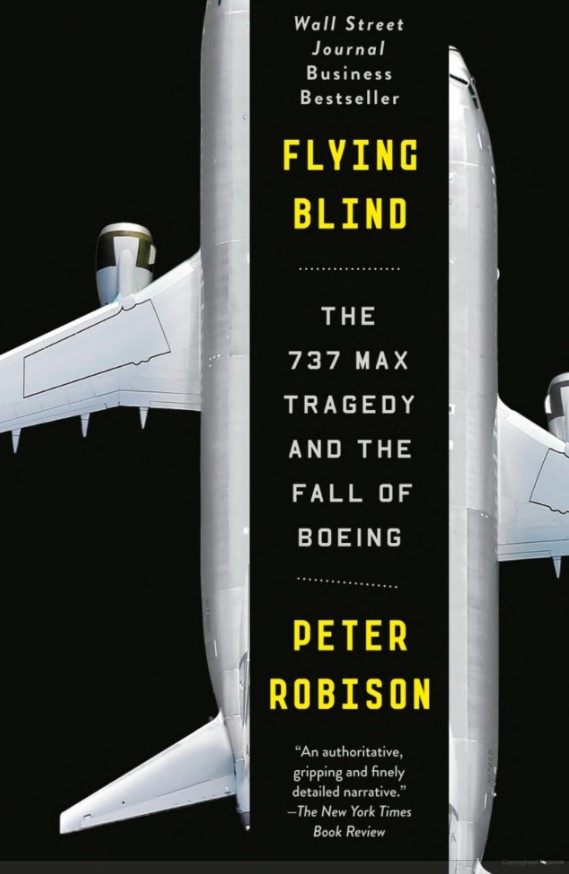Corporate greed kills. Mostly one at a time. But in some cases, hundreds. Specifically, in this case, 346 souls.
Flying Blind: The 737 Max Tragedy and the Fall of Boeing by Bloomberg investigative journalist Peter Robison, is the story of Boeing and corporate greed that led to by development of a faulty airliner: the 737 Max. Flaws in the Max — flaws known to Boeing and hidden from the FAA — led to the two crashes — in Indonesia and Ethiopia — that killed 346 people.
It’s a tragic story from several angles. Boeing was known at a company where engineers ruled and safety mattered. No matter where they were in the production line, how much it would slow a new aircraft’s release, or how much money it would cost, if an engineer at Boeing identified a safety problem, changes would be made. No questions. When Boeing investigators identified the cause of a a major airplane crash was a faulty repair by Boeing, the company immediately owned up to the mistake.
That was all until Boeing merged with McDonnel Douglas and adopted that company’s corporate culture — modeled after Jack Welch at General Electric. Under the new corporate culture, the only focus was on stockholder return — stock buybacks instead of investments in safe engineering. Cost cutting was king and safety problems that would cost too much to correct were ignored.
But this wasn’t just a story of corporate greed. It was also a story of the failure of government oversight. Regulatory reforms passed by Congress and zealously implemented by the George W. Bush administration,+ transformed the Federal Aviation Administration from an agency that oversaw aircraft safety, to an agency that essentially worked for Boeing — not focusing on safety, but rather on ensuring the company made its deadlines — safety be damned. At its best, the FAA, like the Federal Railroad Administration, the Department of Agriculture and other government agencies, are “captured agencies,” with the dual mission of promoting an industry while also regulating it. And when push comes to shove, promotion usually wins over regulation.
Finally, it’s a story of racism. Although the fatal flaw in the 737 Max was identified immediately after the 2018 crash of a Lion Air Boeing 737 Max on October 29, 2018, which killed all 189 passengers, the fleet was not grounded while Boeing took its time to make necessary corrections. No Americans were killed on the Lion Air flight, and Boeing pushed the story that foreign pilots didn’t know how to fly.
It wasn’t until after the Ethiopian Airlines crash on on March 10, 2019, which killed all 157 people, that the FAA finally grounded the 737 Max fleet — only after almost every other country had acted. The thing was, there were a lot of foreign nationals — and Americans — on the Ethiopian Airlines flight. And although Boeing still tried to blame the crash on foreign pilots, it didn’t work that time. The flaw in the Max was well known and Ethiopian airlines was one of the safest airlines in the world.
Flying Blind is a fast, but devastating and infuriating read. I was close to crying as Robison described the sorrow of the families as they learned how their loved ones’ deaths could have been prevented — and how Boeing tried to buy their silence and cover up their culpability.
Unfortunately, the story of corporate greed and captured regulatory agencies isn’t confined to Boeing and the FAA. We saw much the same recently in the East Palestine rail disaster — Precision Scheduled Railroading and insufficient oversight by the Federal Railroad Administration. And we see the effects of corporate greed on the lives and health of workers across the country, as well as the millions of people living near rail lines and chemical plants.
